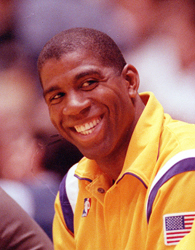His nimbleness on the court earned him the nickname “Magic,” and Earvin Johnson has truly lived up to it. Whether he was facing rival and friend Larry Bird on the court, tackling his HIV head on or working to improve urban areas, Johnson has continually proven his commitment to excellence.
Magic Johnson’s Early Days
Earvin Johnson Jr., born on August 14, 1959, grew up in Lansing, Michigan, with nine siblings. Focused enough to rise at 7:30 in the morning to play basketball on local courts, at age 15 he drew attention for his “uncanny ability to see plays before they developed,” says the Big Ten, which prompted a local sports writer to nickname him “Magic.”
At 6 feet 9 inches, Magic was big for a point guard, but he was unusually agile. He went on to lead his high school team to the Michigan state title, averaging an impressive 28.8 points and 16.8 rebounds per game.
Recruited by basketball powers from all over he country, Johnson chose to stay near home and attend Michigan State University. He starred as a freshman, winning conference freshman of the year and leading the Spartans to their first NCAA tournament appearance in 19 years.
Sources in this Story
- Big Ten Conference: A Champion on Every Level
- NBA.com: Encyclopedia: Magic Johnson Bio
- Sports Illustrated: Most Valuable Person
- NBA.com: The Original Dream Team
- Los Angeles Times: For Magic Johnson, the NBA was only halftime
- Magic Johnson Enterprises: Lakers Name Earvin “Magic” Johnson President of Basketball Operations
Magic’s Basketball Career
Recruited by basketball powers from all over the country, Johnson chose to stay near home and attend Michigan State University in 1977. He starred as a freshman, winning conference freshman of the year and leading the Spartans to their first NCAA tournament appearance in 19 years.
The following season, Johnson and the Spartans made it to the NCAA title game, where they faced Larry Bird and the undefeated Indiana State Sycamores. The match-up between Magic and Bird attracted a massive television audience (the game remains the highest-rated college basketball ever) and launched a personal rivalry that would continue into the NBA. Johnson led Michigan State to a 75-64 victory and was named Most Outstanding Player of the Final Four.
Johnson decided to declare for the NBA Draft after his sophomore season and was chosen first overall by the Los Angeles Lakers. As the starting point guard, the 20-year-old Johnson helped the talented Lakers to the NBA Finals against Philadelphia. With star center Kareem Abdul-Jabbar injured for game 6, Johnson started at center and scored 42 points in the championship-clinching victory. He became the first rookie to be named Finals MVP.
Throughout the 1980s, Johnson not only dominated games, but also made the “Showtime” Lakers the most entertaining team in the league. “He dazzled fans and dumbfounded opponents with no-look passes off the fastbreak, pinpoint alley-oops from halfcourt, spinning feeds and overhand bullets under the basket through triple teams,” writes NBA.com. “When defenders expected him to pass, he shot. When they expected him to shoot, he passed.”
He won three MVPs and was named to the all-NBA first-team nine seasons in a row. He was one of only two players to amass more than 10,000 career assists. Most importantly, he led the Lakers to four more championships, including two over Bird and the Boston Celtics, a franchise that had beaten the Lakers in eight previous championship series.
His career was shockingly halted in 1991, when he was diagnosed with HIV. He sat out the season, but participated in the 1992 All-Star Game, in which he won MVP. It was, wrote Sports Illustrated’s Jack McCallum, “a performance that transcended basketball.”
That spring, he played on the gold medal-winning USA “Dream Team” in the Barcelona Olympics. Though Johnson didn’t play much, he enthusiastically cheered on his All-Star teammates from the bench, and received admiration from fans and opponents alike. “One player, while trying to guard Magic Johnson, was seen frantically waving to a camera-wielding teammate on the bench, signaling to make sure he got a picture of them together,” writes NBA.com.
Johnson attempted an NBA comeback in 1992, but retired during the preseason. He served as Lakers head coach at the tail end of the 1993-94 season, but decided against returning the next season. He returned the NBA in 1995-96 and played 32 games before retiring for good.
The Rest of the Story
Johnson has not rested on his laurels since retirement. Instead, he’s launched himself into other projects including investment in urban neighborhoods, building theatres, coffee shops, gyms and restaurants in the inner city. He even met with gang members in Los Angeles to ask that they keep violence away from a theater that he had been building.
He has been active in HIV/AIDS charity and education, establishing the Magic Johnson Foundation to raise money. He continues to workout frequently, remaining physically fit and AIDS-free. In February 2017, Johnson returned to the NBA, this time as President of Basketball Operations for the Lakers.
This article was originally written by Sarah Amandolare; it was updated July 11, 2017.











